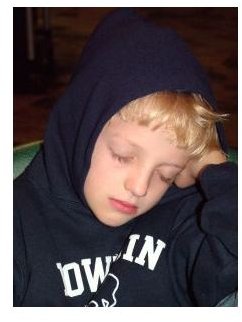Resolving Sleep Deprivation and Attention Deficits
Does ADHD Always Mean Sleep Deprivation?
Many people associate sleep deprivation and attention deficits as co-occurring disorders. Doctors disagree on this issue: One study cites that the quality of sleep in ADHD children is just
as solid as in a control group of non-ADHD children. Researchers say the problem results from the frustration experienced by parents when they begin the nightly chore of wrestling their children down into bed1.
Other researchers insist that there is indeed evidence of disturbed sleep patterns common among their ADHD group compared to a control group2. There is also the fact that many ADHD patients are treated with stimulant medications. But either way, your job right now is to tackle the sleep deprivation so that your child can be at his or her best in the daytime, no matter what the cause.
Causes of Sleeplessness

Have you given thought to other reasons for the inability to enjoy quality sleep? Consider pathologies such as obstructive sleep apnea or restless legs syndrome; allergic problems such as eczema or asthma; thyroid disorders; or mental health diagnoses including depression or anxiety. All these can lead to a correlation between sleep deprivation and attention deficits, often mistakenly diagnosed as ADHD. As sleep deprivation takes its toll, children—just like adults who don’t get enough sleep—demonstrate irritability, impulsivity, impatience, and an inability to concentrate. Sound familiar?
No matter what the cause of your child’s sleep deprivation, be proactive about helping them resolve it with one of these relaxation techniques.
Guided Imagery
Guided imagery is described by many experts as a form of meditation—but it’s a format that children and teenagers readily embrace. Some

professionals practice it in group therapy sessions, with the room darkened. But you can find audiovisual materials that let you practice it with your child as a pre-bedtime activity. Even if it becomes incorporated into your mid-afternoon routine, as long as it’s regular the benefits are likely to be extended to bedtime.
Some instructors recommend guiding the child to begin with. You can start by asking them to picture a blank slate and then visualizing a vague, bare place, like a beach or a wheat field. One item at a time, you ask the child to populate the canvas of their imagination…is the sand white or yellow? Is it warm? What does the water look like? Does it sparkle? Are there waves? Is the sky a different color than the water? And then you add specifics: Is there a boat? What is the boat carrying that the child will like?
Another type of guided imagery has the child considering what’s on the horizon and then being pulled toward or away from whatever is bothering them. Or you can have a child imagine a competitive activity that he or she is going to win.
Progressive Relaxation
People have long practiced progressive relaxation exercises. You can use simple variations for your child who is experiencing sleep deprivation. Try one or more of these:
-
Progressive muscle relaxation – In this routine (the one most people have heard about), you instruct your child to begin at his or her toes and relax their body one part at a time.
-
Ankle rotation – Show your child how to lie on their back and then how to rotate their ankles. How high can they count? Tell him or her to turn their ankles to the right twenty times, and then to the left twenty times, and so on.
-
Investigate deep breathing relaxation exercises – Tell your child to lie flat in bed. You can tuck a pillow under the knees for comfort. Have them place one of their hands on the breastbone and the other one on the diaphragm muscle, right above the stomach. Tell them to take a deep breath; only the hand on the diaphragm should move. This should be practiced slowly, over and over.
-
Extend the deep breathing technique by instructing your child to breathe in while counting slowly to five and then exhale while also slowly counting to five…and then to six…to seven…
Other Meditation and Relaxation Techniques
There are many CDs and books that will help you resolve the sleep deprivation you’ve noticed in your child. Here are a few that are rated highly by Amazon users:
-
Indigo Ocean Dreams, by Lori Lite, is a CD with four tales that take your child bouncing over the ocean, ridding on a bubble, and other

relaxing adventures before bedtime.
-
Starbright – Meditations for Children by Maureen Garth provides illustrated meditations for ages 3-12.
-
The Power of Your Child’s Imagination: How to Transform Stress and Anxiety into Joy and Success by Charlotte Reznick. You’ll find this book useful even if your focus is simply eliminating sleep deprivation and the deficient attention that accrues with it. The author is a Ph.D., a practicing psychologist in California, and you can see examples of guided imagery on her website (link below). She has also several CDs for children, and her work appeared in Psychology Today in October 20093.
Don’t be afraid to try suggestions from friends and family. One person swears by a lilac-scented handkerchief placed beneath the pillowcase. Children who are well into their teens might enjoy practicing yoga techniques. You should also always implement standard parental pre-bedtime guidelines by limiting caffeine and sugar (including fruits) and decreasing physical activity as the time for sleep nears.
Resources
2Gruber R, Sadeh A, Raviv A. Instability of sleep patterns in children with attention-deficit/hyperactivity disorder. Journal of the American Academy of Child and Adolescent Psychiatry. (You must create a free login.)
3Reznick, C. The power of imagination - how children can heal. Psychology Today online blog
Charlotte Reznick’s Website
The Amazon recommendations include:
Indigo Ocean Dreams by Lori Lite
Starbright - Meditations for Children by Maureen Garth
Image Credits:
Product image from Amazon.com
